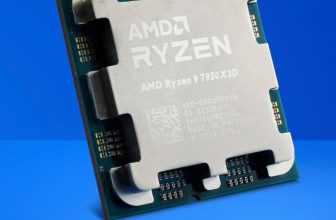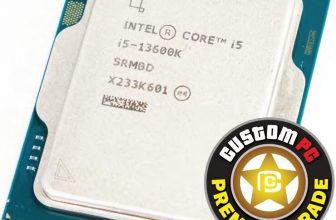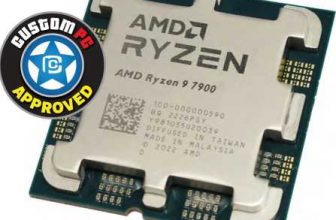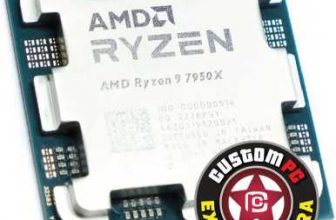INTEL CORE i7-13700K Review
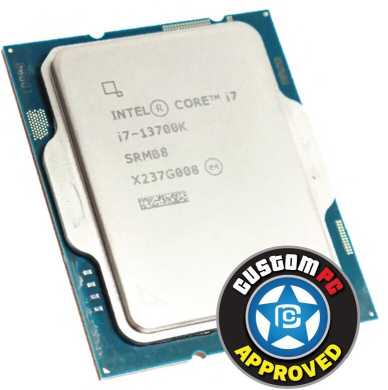
Even though we only reviewed the Core i7-13700K recently, it already costs a little less money than it did at launch, with the latest cuts shaving around £C off its price from a couple of months ago, so it now sits at £ inc VAT. As luck would have it, for those of you sitting there with a tub of popcorn waiting for the fight, the Ryzen 9 7900 now costs about the same amount, while the Ryzen 9 7900X will set you back around £ more. Read our INTEL CORE i7-13700K Review.
AMD’s latest price slashes make for a juicy battle, and here the DDR5 memory and pricier motherboard argument in favour of Intel holds less sway too, since the Core i7-13700K is a high-end CPU that’s more likely to be paired with a premium motherboard and DDR5 memory anyway. Under the hood, the Raptor Cove P-Core count sits at eight, which is the same number of P-Cores found in this chip’s predecessor, the Core i7-12700K.
The number of Gracemont E-Cores has doubled, though, from four to eight, with the CPU giving you a total of 16 cores and 24 threads, compared to 12 cores and 20 threads with the Core i7-12700K. Boost frequencies are noticeably lower than those of the Core i9-13900K, peaking at 5.4CHz for its P-Cores, which is 400MHz lower than the Core i9-13900K, but on the plus side it’s also 300MHz higher than the Core i5-13600K. Multi-threaded workloads saw all P-Cores hit 5.2GHz, so as well as having more P-Cores than the Core i5-13600K, they run faster too.
Overclocking wasn’t as fruitful as on the Core i5-13600K, however, with the Core i7-13700K hitting a wall at 5.5GHz across all P-Cores with a vcore of 1.35V. This is a 100MHz boost to the maximum boost frequency and 300MHz to the all-core P-Core boost frequency. Even at stock speed, though, its a fast CPU, matching the Ryzen 9 7900X in our RealBench tests, with the AMD CPU slightly ahead overall. However, the Intel CPU had a big lead in Cinebench’s multi-threaded test and was quicker in games too.
Once overclocked, it came even closer to matching the Ryzen 9 7900X in the system score and extended its lead in Cinebench too, although this tweak didn’t do much for gaming performance. Meanwhile, its 389W total system power draw under load was thankfully only 60W or so more than that of the Ryzen 9 7900X, but nearly double that of the Ryzen 9 7900, rising to a massive 415W once overclocked.
Despite producing some impressive benchmarks, the Core i9-13900K is still quicker than this chip for multi-threaded work, managing a video encoding score of 1,409,689 compared to 1,197,961 for the Core i7-13700K. The Core i9-13900K also demonstrates its superior content creation might over the 13700K in the Cinebench multi-threaded test.
Conclusion
If you need more poke in content creation than the Core i5-13600K provides, but can’t justify the extra £ for a Core i9-13900K, then the Core i7-13700K is a great choice. Its faster overall than the Ryzen 97900X, and the cash saving overthe Core i9 can practically pay for a motherboard. The Core i7 has often been piggy in the middle recently, but despite the Core i5-13600K being a fantastic buy, the Core i7-13700K offers enough of a step up in performance to justify its price.
SPEC
| Base frequency | P-Core 3.4GHz, E-Core 2.5GHz |
| Max boost frequency | P-Core 5.4GHz, E-Core 4.2GHz |
| Core | Raptor Lake |
| Manufacturing process | 10nm (Intel 7) |
| Number of cores | 8 P-Cores, 8 E-Cores, (24 threads) |
| Hyper-Threading | Yes |
| Cache | 30MB L3,24MB L2 |
| Memory controller | Dual-channel DDR4 and DDRS |
| Packaging | LGA1700 |
| Maximum turbo power | 253W |
| Features | Turbo Boost Max Technology 3, Turbo Boost 2, FMA3, F16C, SHA, BMI / BMI1 + BMI2, AVX2, AVX, AES, SSE4a, SSE4, SSSE3, SSE3, SSE2,SSE,MMX |
VERDICT
When you purchase through links on our site, I may earn an affiliate commission. Here’s how it works.






